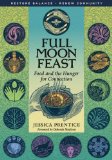
Full Moon Feast
 When Sheila sent me Full
Moon Feast by Jessica Prentice a week ago, I flipped it open to
peruse the recipes then got sucked in and stayed up until after
midnight reading it. First, let me be up front about the book's
downside --- I don't think I would ever try a recipe out of the book
since every single one calls for exotic ingredients I am unlikely to
own. (Orange blossom water, anyone?)
When Sheila sent me Full
Moon Feast by Jessica Prentice a week ago, I flipped it open to
peruse the recipes then got sucked in and stayed up until after
midnight reading it. First, let me be up front about the book's
downside --- I don't think I would ever try a recipe out of the book
since every single one calls for exotic ingredients I am unlikely to
own. (Orange blossom water, anyone?)
But the text, which makes up about three quarters of the book, covers a
fascinating range of history, myth, and psychology about our
relationship with food. I particularly liked one of the winter
chapters which asserted that electricity has changed our winter sleep
patterns which in turn has changed our winter eating habits. The
author says that without electricity, we would sleep for fourteen hours
on these long winter nights, half waking in the middle for a few hours
of near meditation. (In passing, she also notes that in nature
most women give birth between midnight and 4 am for this very reason
--- that at that point in the night, you are in a slightly altered
state of consciousness and don't feel pain in the same way.)
I know that as the nights get longer and longer, my body wants to sleep
more and more, and I have to poke it to get up right at dawn to match
my usual summer wake-up schedule. The book makes me wonder if
perhaps I should be sleeping
more in the winter. I'm such a creature of habit and efficiency,
I find myself pondering how I would get all of my winter chores done if
I slept more in the winter. And how sound is her science ---
after all, didn't humans evolve in the tropics where the nights would
have always been the same length? Needs more thought....
Still, I recommend the book to anyone interested in how food affects
our lives.
Want more in-depth information? Browse through our books.
Or explore more posts by date or by subject.
About us: Anna Hess and Mark Hamilton spent over a decade living self-sufficiently in the mountains of Virginia before moving north to start over from scratch in the foothills of Ohio. They've experimented with permaculture, no-till gardening, trailersteading, home-based microbusinesses and much more, writing about their adventures in both blogs and books.
Want to be notified when new comments are posted on this page? Click on the RSS button after you add a comment to subscribe to the comment feed, or simply check the box beside "email replies to me" while writing your comment.

I've heard that theory before, though the childbirth angle is new to me. If you pay attention to your circadian rhythm, it can make a lot of sense.
AFAIK, circadian rhythms are mostly determined by exposure to light. So humans transplanted from the tropics to the north don't need to evolve to change their sleep cycles.